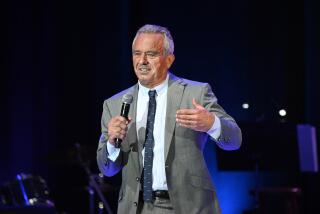Key Breast Cancer Study Was a Fraud
- Share via
A key study pointing to the effectiveness of high-dose chemotherapy and bone marrow transplants in treating metastatic breast cancer was based on faked data, cancer experts said Thursday.
The American Society of Clinical Oncology announced that an unscrupulous South African researcher, Dr. Werner Bezwoda, has led thousands of women with breast cancer to undergo expensive, debilitating and often fatal bone marrow transplants. His data were fraudulent, suggesting the controversial procedure was more effective than it actually is, the society concluded.
“Bezwoda . . . duped us all,” Dr. Larry Norton, the organization’s president-elect, said at a news conference.
The new revelations do not mean that bone marrow transplants are worthless, the oncology society said, only that they have not yet been proven effective. Several large clinical trials are underway to determine precisely how beneficial they are, and the society reiterated its position that women should undergo the procedure only if they are enrolled in a clinical trial.
The oncology society also urged insurance companies to help pay for ongoing clinical trials, but concluded that the companies had no responsibility to pay for bone marrow transplants performed outside those trials.
Bezwoda was fired from his post at the University of Witwatersrand in Johannesburg in 1999 after revelations that he had faked data in a preliminary report of another study on the use of high-dose chemotherapy and bone marrow transplants in patients where the malignancy had spread to lymph nodes.
On Thursday, the oncology society said that an audit of a 1995 paper by Bezwoda showed that it also was fraudulent and took the unprecedented step of withdrawing it.
A specially convened team of experts sent to Johannesburg to audit his 1995 research concluded that there was no scientific basis for Bezwoda’s very positive findings.
The 1995 study had concluded that women with metastatic breast cancer who received high-dose chemotherapy followed by a bone marrow transplant had a 95% response rate, compared to only 53% among women who received conventional treatment. That finding was a linchpin in the ensuing wave of support for the treatment, Norton said, and helped entice many women into undergoing the treatment.
“This is a stunning betrayal of public trust,” said Dr. Lawrence H. Einhorn, the oncology society’s president.
At least 30,000 American women have undergone the procedure at an average cost of about $100,000. In the initial studies, at least, 10% to 20% of the women died as a direct result of the treatment. It has been used less commonly, however, since the initial reports of the fraud that led to Bezwoda’s firing.
Insurance companies’ responsibility to pay for bone marrow transplants has been a great source of controversy and litigation. Several women have received large jury awards because their insurers would not pay. And as many as 10 states have mandated that companies pay for the procedure.
The companies, in turn, have said that the procedure is experimental and that its reputed benefits have not been proved. The oncology society’s statement seemingly validates that position.
The American Cancer Society agrees. “There is no clear proof that high-dose chemotherapy followed by a bone marrow transplant gives a sufficiently improved outcome to warrant insurance companies’ reimbursing for it,” said Dr. Harmon Eyre, the cancer society’s medical director.
Interest in high-dose chemotherapy was already strong when Bezwoda published his 1995 paper. The idea was to use very high doses of anti-cancer drugs to kill breast cancer cells. These doses also kill bone marrow, however, so the patient’s immune system must be rescued with a bone marrow transplant.
Bezwoda’s report, however, was purportedly the first randomized trial to test the effectiveness of the therapy and find a benefit.
“Although it was a trial of only 90 patients, its influence was greatly magnified by the intense debate ongoing in the United States about the value of high-dose chemotherapy for breast cancer,” the oncology society’s report said.
After the scandal about Bezwoda’s 1999 report, the University of Witwatersrand invited a team led by Dr. Raymond B. Weiss of Georgetown University to examine Bezwoda’s records. It uncovered “substantial evidence” of scientific misconduct.
Among its findings:
* The study protocol--or plan--was written nine years after the study actually began.
* There were at least three treatment-related deaths among those receiving high-dose chemotherapy, although the 1995 report said there were none.
* There were no records at all for 29 of the 90 patients.
* There were insufficient records for many other patients, and some women were treated with drugs and regimens not consistent with the published information.
* There were untrue statements in eight other publications by Bezwoda.
“It’s really a terrible story,” said Dr. Stephen Forman, of the City of Hope National Medical Center in Duarte. “You trust physicians to do the right thing, and this was obviously an example where--for reasons only he knows--he not only misled other physicians but, more importantly, misled a lot of women.”
Forman and Dr. John Glaspy of UCLA’s Jonsson Comprehensive Cancer Center agree that the appropriate place for women getting high-dose chemotherapy for their breast cancer is, for now, in clinical trials. But what do you do, asks Glaspy, when a patient with a cancer that is likely to kill her wants treatment--but does not want to take part in a clinical trial?
That question haunts physicians on the front lines. “It’s always a little easier for the generals behind the battlefield with the map to say ‘go left,’ or ‘go right,’ ” he said. “It’s a different issue for the guys with the rifles in the trenches.”
The report and associated material are available at the oncology society’s Web site: https://www.asco.org.






